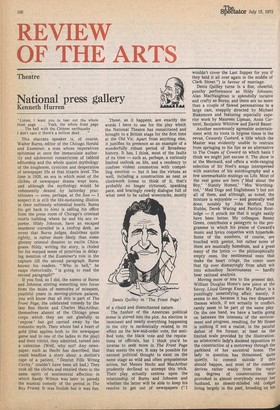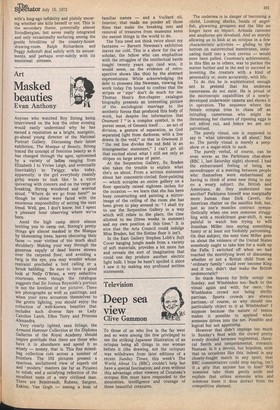REVIEW OF THE ARTS
Theatre
National press gallery
Kenneth Hurren
Listen, I want you to tear out the whole front page . . . Yeah, the whole front page . . . The hell with the Chinese earthquake . . . I don't care if there's a million dead
This staccato speaker is, of course, Walter Burns, editor of the Chicago Herald and Examiner, a man whose imperatives epitomise at once the immaculate authority and adolescent romanticism of tabloid editorship and the whole quaint mythology of the toughness, cynicism and desperation of newspaper life at that bizarre level. The time is 1928, an era in which most of the clichés of newspaper drama were born, and although the mythology would be vehemently denied by latterday practitioners — even, perhaps, at the Sun — I suspect it is still the life-sustaining illusion in their ruthlessly whimsical hearts. Burns (to get back to him) is calling his office from the press room of Chicago's criminal courts building where he and his ace reporter, Hildy Johnson, have an escaped murderer corralled in a rooftop desk, an event that Burns judges, doubtless quite rightly, is rather more likely than some gloomy oriental disaster to excite Chicagoans. Hildy, writing the story, is chided for his warped sense of priorities in delaying mention of the Examiner's role in the capture till the second paragraph. Burns knows his readers. "Who in hell," he rasps rhetorically, " is going to read the second paragraph?"
If you find, as I did, the names of Burns and Johnson stirring something into focus from the mists of memories of misspent, youthful years in moving-picture palaces, you will know that all this is part of The Front Page, the celebrated comedy by the late Ben Hecht and Charles MacArthur, themselves alumni of the Chicago press corps which they set out gleefully to ' expose ' but got carried away by the romantic myth. Their whore had a heart of gold (that applies both to the newspaper game and to one of the ladies in the play) and their vitriol, they admitted, turned into a valentine. (Well, why not? Any newspaper, such as Hecht has described, that could headline a story about a dentist's rape of a patient, "Dentist Fills Wrong Cavity," couldn't have been all bad.) They took all the clichés and retailed them in the same spirit of sentimental affection in which Sandy Wilson was later to parody the musical comedy of the period in The Boy Friend. It was foolish but it was fun. These, as it happens, are exactly the words I have to use for the play which the National Theatre has resuscitated and brought to a British stage for the first time at the Old Vic. Apart from anything else, it justifies its presence as an example of a wonderfully robust period of Broadway history. It has, I think, most of the faults of its time — such as, perhaps, a curiously limited outlook on life, and a tendency to confuse violent commotion with compelling emotion — but it has the virtues as well, including a construction as neat as clockwork (come to think of it, that's probably no longer virtuous), spanking pace, and bracingly rowdy dialogue full of what used to be called wisecracks, mostly of a ribald and disenchanted nature.
The funfair of the American political scene is stirred into the plot. An election is imminent and nearly everything happening in the city is sardonically related to its effect on the law-and-order vote, the antiRed vote, the black vote and the reputations of officials, but I think you'd be unwise to seek more in The Front Page than meets the eye. It may be possible for earnest political thought to exist on the same stage as wild and often preposterous action, but Messrs Hecht and MacArthur prudently declined to attempt this trick. Their play actually centres upon the relationship of Burns and Johnson and whether the latter will be able to keep his resolve to get out pf newspapers (" I wouldn't cover the Last Supper for you if they held it all over again in the middle of Clark Street ") in favour of marriage.
Denis Quilley turns in a fine, cheerful, punchy performance as Hildy Johnson; Alan MacNaughtan is splendidly incisive and crafty as Burns; and there are no more than a couple of flawed personations in a large cast, snappily directed by Michael Blakemore and featuring especially superior work by Maureen Lipman, Anna Car teret, Benjamin Whitrow and David Bauer.
Another enormously agreeable entertainment with its roots in bygone times is the revue, Cowardy Custard, a title which the Master was evidently unable to restrain from springing to his lips as an alternative to The Cream of Coward on which basis I think we might just excuse it. The show is at the Mermaid, and offers a wide-ranging selection of Sir Noel's songs interspersed with snatches of his autobiography and a few unremarkable musings on Life. Most of the real gems are here (` Mad about the Boy,' 'Stately Homes,' 'Mrs Worthington,' 'Mad Dogs and Englishmen ') but not all of them, and although, as noted, the mixture is enjoyable — and generally well done, notably by John Moffatt, Una Stubbs, Derek Waring and Patricia Routledge — it struck me that it might easily have been better. My colleague, Benny Green, contributes a panegyric to the programme in which his praise of Coward's music and lyrics coquettes with hyperbole. Some of the numbers, of course, are touched with genius, but rather more of them are musically humdrum, and a great many of the lyrics — the philosophically empty ones, the sentimental ones that make the heart cringe, the comic ones that tip over dismayingly from adult wit into schoolboy facetiousness — hardly bear rational analysis.
Moving more or less to the present day, William Douglas Home's new piece at the Savoy, Lloyd George Knew My Father, is a puzzlingly unsatisfying affair, mainly, it seems to me, because it has two disparate themes which, if not actually in conflict, rarely seem to be part of the same play. On the one hand, we have a battle going on between the interests of the environment and progress, resulting, for Mr Home is nothing if not a realist, in the painful defeat of the former, at least on the limited scale provided by the illustration: an aristocratic lady's doomed opposition to the construction of a motorway through the parkland of her ancestral home. The lady in question has threatened, quite quietly, to commit suicide if this should happen, and most of the comedy derives rather wanly from the varying degrees of consternation thus provoked in almost everybody except her husband, an absent-minded old codger living largely in the past, brooding on his wife's long-ago infidelity and plainly uncaring whether she kills herself or not. This is the secondary theme, potentially almost Strinclbergian, but never really integrated and only occasionally surfacing among the gentle frivolities of the country-house drawing-room. Ralph Richardson and Peggy Ashcroft deal subtly with its amusements, and perhaps over-subtly with its emotional stresses.











































 Previous page
Previous page